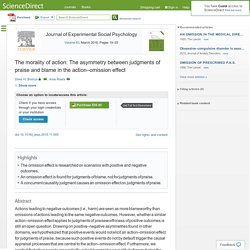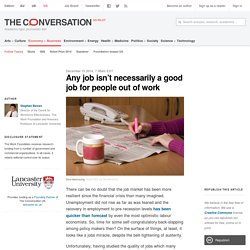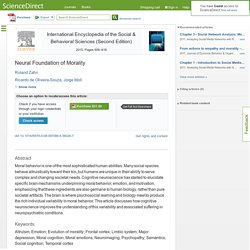

Can Game Theory Save Voters From Ourselves (And Donald Trump)? The morality of action: The asymmetry between judgments of praise and blame in the action–omission effect. Ghent University, Department of Developmental, Personality, and Social Psychology, Henri Dunantlaan 2, B-9000 Ghent, Belgium Received 22 October 2015, Revised 17 November 2015, Accepted 23 November 2015, Available online 2 December 2015 Choose an option to locate/access this article: Check if you have access through your login credentials or your institution Check access doi:10.1016/j.jesp.2015.11.005 Get rights and content Highlights The omission effect is researched on scenarios with positive and negative outcomes.

An omission effect is found for judgments of blame, not for judgments of praise. A concurrent causality judgment causes an omission effect on judgments of praise. Abstract Actions leading to negative outcomes (i.e., harm) are seen as more blameworthy than omissions of actions leading to the same negative outcomes. Keywords Omission-bias; Action effect; Casual appraisal; Praise; Moral cognition Copyright © 2015 Elsevier Inc.
Populist personalities? The Big Five Personality Traits and party choice in the 2015 UK general election. To what extent are decisions at the ballot box driven by a voter’s personality?

In this article, James Dennison examines the association between personality traits and party choice in the UK’s 2015 general election. He finds, among other things, that UKIP and Green voters are the most closed and open-minded respectively. Why people vote for certain parties remains one of the most regularly investigated areas of political science. Ever since the earliest works on voting, explanations for party choice have generally focused on the voter’s socio-demographic position, their personal background and peer group or the political and economic context in which they live.
More recently, scholars have turned to less conventional determinants of party choice. Although a number of psychological frameworks exist to comprehensively describe individuals, the Big 5 has come to dominate the field over the last 20 years. Table 1: The ‘Big 5’ Personality Traits (adapted from Gerber et al, 2011) Related. Theconversation. There can be no doubt that the job market has been more resilient since the financial crisis than many imagined.

Unemployment did not rise as far as was feared and the recovery in employment to pre-recession levels has been quicker than forecast by even the most optimistic labour economists. So, time for some self-congratulatory back-slapping among policy makers then? On the surface of things, at least, it looks like a jobs miracle, despite the belt-tightening of austerity. Unfortunately, having studied the quality of jobs which many people in the UK are now doing, this is not entirely the case.
The UK labour market is, indeed, performing well but we have a growing and potentially corrosive problem of poor quality, precarious and temporary work which threatens our productivity and competitiveness, levels of social inclusion and, ultimately, the health of the workforce. Work and well-being There’s a clear link between being engaged in “good work” and mental health. Click to enlarge.
Neural Foundation of Morality - International Encyclopedia of the Social & Behavioral Sciences (Second Edition) Roland Zahn Translational Congnitive Neuroscience of Affective Disorders Laboratory, The University of Manchester, School of Psychological Sciences, Manchester, UK.

D'Or Institute for Research and Education (IDOR), Rio de Janeiro, Brazil Available online 17 February 2015 17 February 2015 Choose an option to locate/access this article: Check if you have access through your login credentials or your institution. Immorality East and West. Ethical blind spots: explaining unintentional unethical behavior. Harvard University, Soldiers Field Road, Harvard Business School, Boston, MA 02163, USA Available online 1 May 2015 Choose an option to locate/access this article:

Opinionator.blogs.nytimes. Your Brain, Your Disease, Your Self. 13546783.2015.1051585#